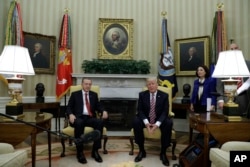A demonstrator involved in the last week's violent clash with guards of Turkish President Recep Tayyip Erdogan tells VOA a lawsuit will be filed over injuries sustained during the May 16 melee outside the Turkish ambassador's residence in Washington.
Armenia-born Lucy Usoyan, an ethnic-Yazidi who became a U.S. citizen after moving here with family at age 3, sustained a traumatic brain injury during last week's brawl. In footage recorded by VOA Turkish, Usoyan, who is wearing red pants, can be seen lying unconscious on the ground near at the 25-second mark.
“Many law offices have reached to us. Big law offices that have sued different governments,” she told VOA's Armenia Service on Tuesday. “We will also have a lobbying office to represent this case, because we believe no government — not only Turkey — no government has the right to come to this country and beat up U.S. citizens and get away with it.”
A day after the brawl, VOA posted additional footage of moments leading up to the fight, during which President Erdogan — arriving at the residence after White House meetings — is seen talking with members of his armed security detail just before they break through a police line and violently charge the protesters. Moments later, Erdogan is seen looking on as the attack unfolds.
Strained relations
Turkish supporters claim they were provoked by protesters whom, they allege, support the Peoples' Protection Units (YPG), which Erdogan's government considers a terrorist group for its links to the Kurdistan Workers' Party (PKK). The PKK, with affiliates based in Turkey and Iraq, has been labeled a terrorist organization by the U.S. and European Union.
Ties between Washington and Ankara have been strained in recent years by American airpower support for YPG fighters battling Islamic State militants in northern Syria.
American lawmakers swiftly issued bipartisan outcry over the melee, which was followed by repeated expressions of concern by top State Department officials, who summoned Turkey's ambassador over the incident.
'Ongoing investigation'
“There is an ongoing investigation,” Secretary of State Rex Tillerson told Fox News Sunday, adding that he will wait on the outcome of that probe before deciding on a more formal response.
Globally, however, Usoyan says the absence of a formal White House response makes the administration of U.S. President Donald Trump look weak.
“In this case, the video went viral around the world,” Usoyan said. “I was talking to my family and relatives last night, and everyone takes this as a (sign of the) weakness of our current government. I do believe President Trump should shed a spotlight to this case and address this issue so it doesn't spotlight him as weak towards Turkey.”
Police behavior questioned
On Monday, Turkey summoned the U.S. ambassador to Ankara to protest what it called the “aggressive” treatment of Turkish security, calling behavior of Washington Metropolitan police officers who attempted to break up the fight — sometimes with batons — “aggressive and unprofessional.”
The Trump administration has vowed to arm YPG fighters as part of a campaign to take Islamic State's Syrian stronghold in Raqqa.
Erdogan and Trump are expected to meet again at this week's NATO summit in Brussels.
This report originated in VOA's Armenian Service.





